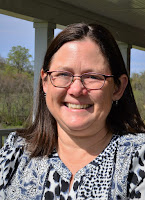It's a terrific coming of age story about a disabled girl who, through grit and determination, beats all the odds. Set in England during the Second World War, it also features a fascinating historical backdrop. It's an inspiring and uplifting story, but one that is also full of adventure.
To view the latest August edition of our newsletter, click here. To sign up to our monthly newsletter, click here.
North Melbourne Books Talks to Kimberly Brubaker Bradley
Photo by Katherine Bradley (author's daughter)
North Melbourne Books: Nine-year-old Ada has never left her home in London due to an uncaring mother who is ashamed of her daughter’s twisted foot. As the dangers of World War Two swiftly approach, Ada and her younger brother are transported to a coastal village for safety. The children are taken in by Miss Susan Smith who offers the children not only a home, but also the opportunity to learn, grow and be loved. However, not only is the war getting closer , but Ada’s cruel mother threatens to tear the new friendship apart. What inspired you to write an historical novel, set during the Second World War?
Kimberly Brubaker Bradley: Inspiration comes from so many places that once the novel's finished it's very hard to go back and find the threads. I started with an interest in WW2 on the British homefront, because it's frankly a lot more interesting than the homefront in the US, where I'm from, yet still very accessible. I find the evacuation fascinating - the government transported 3 million children out of cities over the course of 2 days - then summarily dumped them in the countryside, with absolutely no thought to who would be taking them in. And from a child's point of view, it's "we're going to take you to safety while your parents stay home and get bombed." But then I thought - what if, for one child, the evacuation was not only positive, but life-saving? And I was on my way.
NMB: You paint a vivid picture of the London Blitz and England during wartime. Have you always had an interest in this period of English history, particularly the evacuation of children during the bombing? Were there any books that were particularly helpful in crafting your story?
KB: I've always loved England; I read so many English books as a child that I developed an oddly British vocabulary. This is actually a very accessible part of history to research, because it's important to the Brits and they teach it in their schools. You can buy replica ration books, identity cards, and all sorts of facsimiles of wartime publications on victory gardening, or how to cook without fat or eggs. In addition, an awful lot of evacuees grew up and wrote down their own accounts of the war - these aren't published in the United States but they're easy to get via the internet. And then, just by luck, the British were in the middle of a big sociological data-collecting drive called Mass Observation, in which they asked private citizens from all walks of life, all over the Isles, to keep diaries and periodically mail them in. Parts of many of these have been published, and others are available to study on line. So those are real-time accounts of what the war was like on a day-to-day basis. They're invaluable.
NMB: Ada's story is extraordinarily moving, especially as she starts to stand up for herself and learns her own worth. What does the novel mean to you?
KB: This is my 16th published book, and without a doubt my best work so far. I had to work really, really, hard to tell this story right - the first chapter alone went through something like a dozen drafts. But when I finished it, I knew I'd achieved what I set out to do, and I was very happy with it.
NMB: How has The War That Saved My Life been received by readers so far?
KB: It's going over extraordinarily well. In the States, it was a Newbery Honor book, and won the Schneider, Odyssey, and Josette Frank awards. The paperback debuted at #1 on the New York Times Bestsellers List, which astounds me. But better than that - I really mean this - child readers are loving it. They're telling me they read it over and over again. They care very much about Ada, and Jamie, and Butter and Bovril. They all hope Mam dies in the sequel, but they'd be very upset with me if anything bad every happened to Bovril.
NMB: What books are you reading at the moment?
Let's see. In the past two weeks, I've read Kate diCamillo's new Raymie Nightengale, Kat Yeh's The Truth About Twinkie Pie, Kwame Alexander's Booked, Donna Gephart's Lily & Dunkin, and Richard Peck's upcoming masterpiece, which I read in galleys, The Best Man. That's an awfully good set of books, a great run. I've also read a couple of books for review that I can't mention by title, and some adult nonfiction, and I'm partway through an adult period mystery.
The War That Saved my Life, by Kimberly Brubaker Bradley. Published by Text. RRP: $16.99


No comments:
Post a Comment